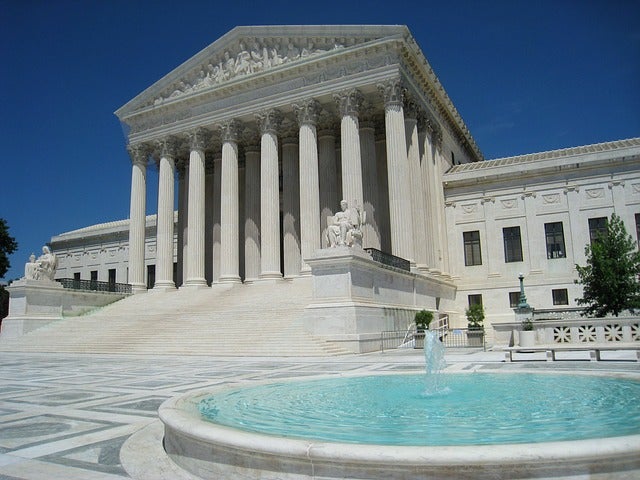New Development in Demand Response Ruling Signals Possible Supreme Court Review
UPDATE: Yesterday, January 15th, 2015, the Solicitor General formally asked the Supreme Court to review the demand response case, EPSA v. FERC. This action is a welcome step by the Solicitor General. Now the Supreme Court must decide whether or not to hear this important case.
Late last week, the Solicitor General signaled its intention to file cert. before the Supreme Court in the demand response Order 745 case, EPSA v. FERC. Hidden within this legalese is an important update about a significant (and already complex) case.
So what does it all mean?
First, a bit of background
Demand response pays customers to conserve energy when the electric grid is stressed. With demand response, people and technology, not power plants, help meet energy demand. This is good news for customers, who pay less for electricity, the environment, via reductions in harmful air emissions, and the electric grid, by making it more efficient.
The Federal Energy Regulatory Commission (FERC), tasked with ensuring our nation’s wholesale electricity rates are ‘just and reasonable,’ created Order 745 to ensure that those providing demand response as a service would be adequately compensated.
This all changed, however, in a recent court ruling, which found that FERC lacked legal authority to regulate demand response. This decision was widely criticized, with White House Counselor John Podesta recently stating, “We think this is a very significant and mistaken decision and we’re hopeful that in time we can see it reversed.”
After an unsuccessful petition for en banc review (meaning that the entire D.C. Circuit Court of Appeals would review the earlier court ruling), FERC was left with one option: ask the Supreme Court to review the decision and reinstate Order 745. However, FERC has no right to appeal to the Supreme Court; instead, the Supreme Court has discretion whether to accept the appeal.
Supreme Court discretionary review is no walk in the park
The Court receives roughly 10,000 petitions for discretionary review (i.e. requests for a case to be heard) each term and only hears 75-80, approximately. For those keeping track at home, that translates to roughly .8 percent.
However, for a federal agency, there is an initial and vital step that must be taken before even requesting the Supreme Court to review a case: The agency must ask the Solicitor General to bring the case. Why? Because the Solicitor General acts as attorney in all Supreme Court cases where the United States government is involved.[Tweet “#DemandResponse ruling and possible Supreme Court review. What does it all mean? http://ow.ly/FKboa “]
Since the Solicitor General must fulfill this duty for all parts of the Federal government, it naturally has the right to decide against bringing any one particular case. This is both good and bad: the Solicitor General often chooses not to bring a case based on what it determines is the likelihood of success; however, the Supreme Court is historically more likely to review a case where the Solicitor General is involved.
So what does this mean for demand response, FERC, and Order 745?
The Solicitor General’s intention to appeal before the Supreme Court signals an important step in the Order 745 case. The Solicitor General, as ‘gatekeeper’ to cases involving the United States government, has signaled this is a case it believes to be worthy of review by our nation’s highest court. It’s not a responsibility the Solicitor General takes lightly, and its decision shows why this case is so important.
The next step in this legal process is for the Solicitor General to file its brief by January 15th (stating why the Supreme Court should review the lower court’s decision). From there, all eyes will be on the Supreme Court to see whether or not they decide to take up the case.
In the meantime, EDF will be watching this case closely and keeping our Energy Exchange readers up-to-date on new advancements. Regardless of the outcome, there’s no doubt demand response is an invaluable clean energy resource that must play an important role in our transition to a clean energy future. How the Supreme Court decides to treat this case will have a significant effect on how demand response is valued in our energy markets, and to what extent Americans are able to reap the full benefits of this important resource.












2 Comments
If the 10,000 filed and 75-80 heard for a hit rate of 0.8%, what are the stats for how many cases the solicitor general has filed vs been accepted to be heard? Just curious what numbers are vs “historically more likely to review”
Chris, thanks for reading, and great question! It’s always difficult to predict what cases the Supreme Court will hear, and exactly what involvement by the Solicitor General means. However this law review article is a good example of what their involvement means, generally: http://papers.ssrn.com/sol3/papers.cfm?abstract_id=1377522.
Another interesting article can be found here, http://www.bc.edu/content/dam/files/schools/law/bclawreview/pdf/51_5/01_cordray.pdf, and make sure to read footnote 27, which details how few cases the Solicitor General actually decides to bring to the Supreme Court.
-Michael